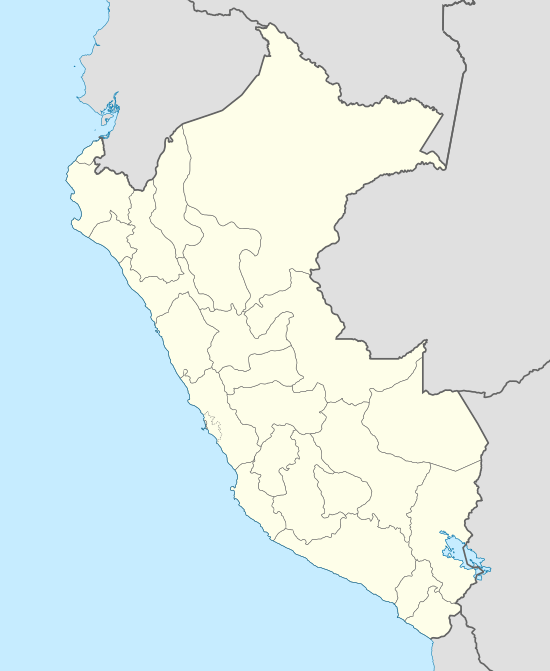Maria Reiche Neuman Airport
The Maria Reiche Neuman Airport (IATA: NZC, ICAO: SPZA) is a small airport serving Nazca, in the Ica Region of Peru. The airport is named after Maria Reiche, a principal researcher and proponent of the Nazca Lines.
Maria Reiche Neuman Airport Nazca Airport | |||||||||||
|---|---|---|---|---|---|---|---|---|---|---|---|
| Summary | |||||||||||
| Operator | CORPAC | ||||||||||
| Location | Nazca, Ica, Peru | ||||||||||
| Elevation AMSL | 1,860 ft / 567 m | ||||||||||
| Coordinates | 14°51′15″S 74°57′40″W | ||||||||||
| Map | |||||||||||
 NZC Location of the airport in Peru | |||||||||||
| Runways | |||||||||||
| |||||||||||
The airport receives a small number of domestic charter flights. The main use of the airport is for tourist flights over the Nazca Lines.
Airlines and destinations
| Airlines | Destinations |
|---|---|
| Aero Cóndor | Lima |
| Aerodiana[3] | charter flights over the Nazca lines |
| AirMajoro[4] | charter flights over the Nazca Lines |
| Aero Paracas [5] | charter flights over the Nazca Lines |
| Aero Nasca[6] | charter flights over the Nazca Lines |
| Alas Peruanas[7] | charter flights over the Nazca Lines |
| MovilAir[8] | charter flights over the Nazca Lines |
Accidents and incidents
- On 10 June 2010, an AeroDiana Cessna 208 on a sightseeing flight over the Nazca Lines went missing. Authorities suspect that it was hijacked, as a number of occupants had false identities. The pilot and co-pilot later were found alive, but there has been no sign of the aircraft and remaining passengers since.[9]
gollark: This sounds horribly complicated and using PHP isn't helping.
gollark: I thought this was not really meant to happen (but inevitably did somewhat)?
gollark: Flash had a crossdomain.xml thing but it was terrible somehow.
gollark: They feared badly configured HTTP proxies, so there's a convoluted masking scheme in place to make sure that the server cannot control the exact content of messages from the browser.
gollark: TCP sockets would allow browsers to access arbitrary SSH servers and such.
References
External links
This article is issued from Wikipedia. The text is licensed under Creative Commons - Attribution - Sharealike. Additional terms may apply for the media files.